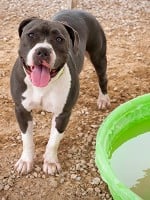
When summer temperatures in Las Vegas soar, your pets need your help to beat the heat and stay safe. Here a 10 safety tips to follow this summer to help protect your pets from our infamous summer heat and the risk of heat stroke.
1. Bring your pets indoors
When Las Vegas gets into triple-digit temperatures, shady areas are likely too warm to cool a hot pet. Dog houses don’t help because of poor air circulation. Let your dogs and cats join you inside the house to protect them from the high temperatures, the sun, and the risk of skin cancer.
2. Walk your dog during cooler hours
If the pavement is too hot for bare feet, it’s too hot for dog (and cat) paws. And no matter how cute they look, most dogs hate wearing shoes. Save your pooch’s paws by walking them on dirt or grass (instead of hot sidewalks and pavement), and walk during the early morning or evening, when the sun is least harsh. Remember, temperatures on concrete and asphalt can be 20 to 30 degrees hotter than the air temperature.
3. Provide plenty of fresh water
Dogs and cats can get dehydrated quickly. Fresh, cool water helps keep pets hydrated during the summer, and adding ice cubes to their bowls can be a special treat!
4. Think twice about that summer haircut
Dogs’ and cats’ coats are insulating not just against the cold, but also against the heat. Dogs with thick coats naturally shed, so they have lighter coats in the summer. Brush your dog’s fur regularly to allow for better air circulation. If you still want to give your longhaired dog a summer cut, use a professional groomer and never shave down to the skin.
5. Never leave a pet alone in a parked vehicle
Even with the windows down and AC on, pets can overheat in cars. How hot is too hot? On an 85-degree day, the inside of a parked car can reach 102 degrees in 10 minutes. Never leave a pet alone in a parked vehicle. It can lead to fatal heat stroke. It’s also illegal in Nevada to “allow a cat or dog to remain unattended in a parked or standing motor vehicle during a period of extreme heat or cold or in any other manner that endangers the health or safety of the cat or dog.” It’s best to leave them at home indoors — just think how excited they’ll be to greet your return!
6. Recognize the risks
Just like people, the old, the young, the overweight. and the sick are more at risk from heat-related illnesses than other dogs. Additionally, breeds with snub noses, such as pugs, shih tzus, Boston terriers and boxers, have more difficulty in extreme heat than other breeds since they can’t pant as effectively. Persian cats are also more susceptible to overheating
7. Watch for signs of heat stroke
Heat stroke is dangerous for animals, and can quickly turn deadly. Watch for signs like:
• Heavy panting
• Glazed eyes
• Rapid heartbeat
• Difficulty breathing
• Excessive thirst
• Excessive drooling
• Fever
• Vomiting
• Seizures or unconsciousness
If your pets experience any of these symptoms, take them to the vet immediately. Provide water, get them into a cool spot, apply ices packs/cold towels to the pet’s head, neck, and chest or run cool – not cold – water over them. Organ failure can begin soon after the symptoms start, so the sooner emergency aid is administered, the better.
8. Apply pet-safe sunscreen to your dog
Sunburn can affect pets the same way it affects humans – pain, peeling, and skin cancer. Use a pet-safe sunscreen on unprotected areas, like the tips of the ears, the skin around the lips, and the tip of the nose.
9. Exercise only with caution
Many dogs are high-energy and love a good game of ball or frisbee. Keep any exercise sessions extremely short and have water available. If you aren’t comfortable exercising in the heat, then your pets aren’t going to be either. Definitely take it easy until the temperatures cool off.
10. For fun, get a dog pool
For dogs, you may want to consider investing in a child’s wading pool so they can get inside and splash around if they want. Never leave pets unsupervised around a swimming pool. Not all dogs are great swimmers and unless you have taught them, may not know how to get out of the pool.










